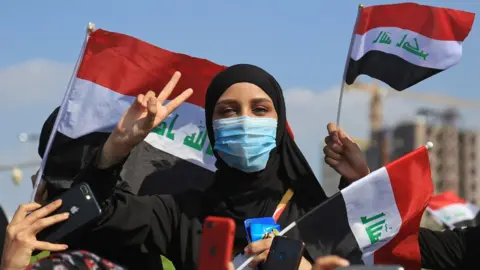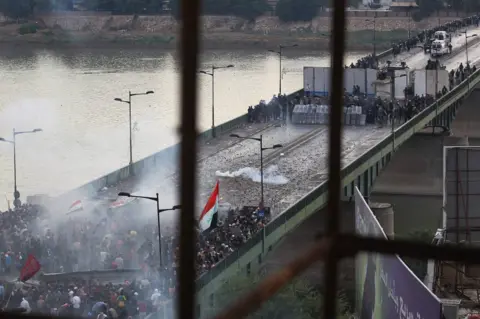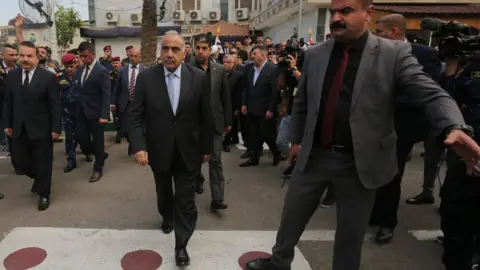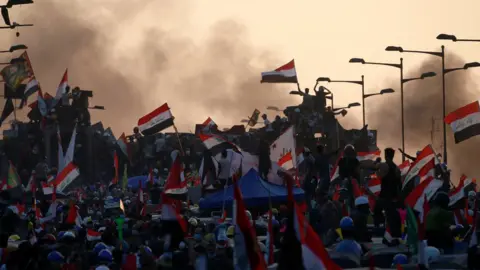Iraq protests: PM Adel Abdul Mahdi 'will resign if replacement is found'
 AFP
AFPIraqi Prime Minister Adel Abdul Mahdi will resign if political parties can agree on his replacement, the president has said, as mass protests continue.
President Barham Saleh is also drafting a new election law that will allow early parliamentary polls to be held.
Tens of thousands of people have taken part in two waves of protests this month to demand more jobs, an end to corruption, and better services.
More than 250 have been killed in clashes with security forces.
At least one protester died early on Thursday after being hit in the chest by a tear-gas canister at a demonstration in Baghdad - the sixth such fatality in a week.
 AFP
AFPAmnesty International said riot police in the capital had been firing heavy, military-grade tear-gas grenades at people at point-blank range, apparently aiming for their heads or bodies. Photos have showed grenades lodged in some victims' skulls.
"What we've documented with these grenades in Baghdad goes far beyond misuse of a 'safer' weapon - the very design of the grenades being used is maximising the horrific injuries and death," said Lyn Maalouf, the group's Middle East director.
"Iraq's police force must recall them from use immediately," she added.
Mr Abdul Mahdi, a veteran Shia Islamist politician with a background in economics, became prime minister just over a year ago, promising reforms that have not materialised.
On 1 October, young Iraqis angered by his failure to tackle high unemployment, endemic corruption and poor public services took to the streets of Baghdad for the first time. The protests escalated and spread across the country after security personnel responded with deadly force.
 AFP
AFPAfter the first wave of protests, which lasted six days and saw 149 civilians killed, Mr Abdul Mahdi promised to reshuffle his cabinet, cut the salaries of high-ranking officials, and announced schemes to reduce youth unemployment.
But the protesters said their demands had not been met and returned to the streets on Friday.
The epicentre of the unrest has been Baghdad's central Tahrir Square. Protesters there have been attempting to cross a nearby bridge to the fortified Green Zone, which houses government buildings and foreign embassies.
On Monday, the leader of the largest bloc in parliament, populist Shia cleric Moqtada Sadr, urged the prime minister to call early elections.
The next day, Mr Abdul Mahdi told Mr Sadr in an open letter he would be willing to do so, but that there were constitutional requirements "the prime minister must abide by."
"If the goal of elections is to change the government, then there is a shorter way: for you to agree with [Hadi] al-Amiri to form a new government," he wrote, referring to Iran-backed paramilitary leader who leads parliament's second largest bloc.
Mr Sadr responded by calling on Mr Amiri to help him oust the prime minister through a vote of no confidence in parliament, which would trigger elections.
On Thursday, President Saleh announced on television that Mr Mahdi had agreed to step down once the blocs found "an acceptable alternative".
"This is in light of the commitment in the constitutional and legal contexts to prevent a constitutional vacuum," he added.
The president said he would also call early elections, but not until a new electoral law had been passed.
 Reuters
ReutersIn the space of a few days, two Arab prime ministers have been forced to resign because of street protests - the other one was Saad Hariri in Lebanon.
BBC Middle East editor Jeremy Bowen says the demonstrators in both countries have remarkably similar grievances - and they are shared by many others across the region.
It is too early to say whether there will be upheaval on the scale of the Arab uprisings of 2011, he adds, but the factors that took people on to the streets then still exist in 2019.
